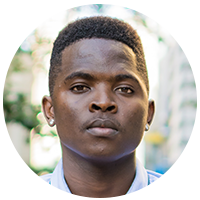Present Perfect Tenses: Unfinished Actions and States
We can use Present Perfect tenses when we want to talk about unfinished actions, states, or habits that started in the past and continue into the present. They have not finished yet.
- He’s been here since 7AM. (he arrived in the past at 7AM and he is still here now)
- They have been living together for a long time (they started living together sometime in the past and continue to live together now)
- Have you lived in this home long? (a question asking the duration of time the person has lived in the house (starting in the past and continuing until now))
Present Perfect Simple
We use Present Perfect Simple to talk about unfinished actions, states, or habits that started in the past and continue to the present. We use it to describe the duration of the action or state.
- I’ve known Gary for 30 years.
- I’ve worked in Vancouver for 10 months.
- I’ve played tennis since I was a child.
Present Perfect Simple + ‘Since / for’
We use since for a specific start time in the past. We use for for a duration of time.
- I’ve played baseball since 1999. (specific start time)
- I’ve had a cold for a week. (a duration of time)
Present Perfect Continuous
We use Present Perfect Continuous tense to also show something started in the past and has continued until now. It has not finished yet. We use past time expressions to indicate when the action started.
- I have been working for 3 hours.
- She has been teaching at the school since April.
- I have been waiting for 5 minutes.
Present Perfect Continuous + ‘recently / lately’
You can use Present Perfect Continuous tense WITHOUT a time expression by using lately or recently. With the time expressions lately or recently, the time has a more general meaning. We use lately or recently to emphasize this general meaning of time.
- I have been feeling tired lately.
- I have been exercising recently.
- Lately, I’ve been playing a lot of video games.
Present Perfect Simple vs. Present Perfect Continuous
Although there are usually differences between using the Present Perfect Simple and the Present Perfect Continuous, sometimes is little to no difference between them:
- I’ve smoked since high school.
- I’ve been smoking since high school.
- He’s played guitar for a long time.
- He’s been playing guitar for a long time.
In both examples, the actions started from the past and continue into the present. Some common verbs used like this are play, work, live, and teach.
However, you must be careful with stative verbs. They are rarely used in Present Perfect Continuous form. Stative verbs are verbs that you cannot see someone doing physically. For stative verbs, we use Present Perfect Simple form instead.
- I’ve hated chocolate since I was a child. (correct)
- I’ve been hating chocolate since I was a child. (incorrect)
Here is a list of common stative verbs:
- agree
- appear
- believe
- belong
- contain
- doubt
- own
- feel (have an opinion)
- hate
- hear
- imagine
- know
- like
- love
- prefer
- promise
- remember
- think (have an opinion)
- understand
- want
- wish
Now complete the exercises and come back to the lesson.
Speaking
Tell your partner(s) the following phrases. Your partner(s) need to complete the phrase with the appropriate time expression or Present Perfect verb tense. If you are given a time expression, use the time expressions at the end of the sentence.

...since 2007
I've lived in Japan since 2007.


Correct!
I've been learning...


I've been learning French for the last 3 months.
- ...since I was a child.
- I have been trying...
- ...for a week.
- I have thought about...
- ...recently.
- I have loved...
- ...for 3 months.
- I have been studying...
- ...since last year.
- I haven’t been...
- I have been thinking...
- ...lately.
- I have remembered…
- ...this week.
- I have bought...
- ...since April.
- I have had...
- ...for one year.
- I have eaten...
- ...recently.